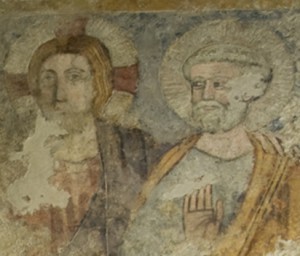
Scott Hahn with David Scott
Trust in God—as the Rock of our salvation, as the Lord who made us His chosen people, as our shepherd and guide. This should be the mark of our following of Jesus.
Like the Israelites we recall in today’s Psalm, we have made an exodus, passing through the waters of Baptism, freeing us from our bondage to sin. We too are on a pilgrimage to a promised homeland, the Lord in our midst, feeding us heavenly bread, giving us living waters to drink (see 1Cor 10:1-4).
We must take care to guard against the folly that befell the Israelites, that led them to quarrel and test God’s goodness at Meribah and Massah.
We can harden our hearts in ways more subtle but no less ruinous. We can put our trust in possessions, squabble over earthly inheritances, kid ourselves that what we have we deserve, store up treasures and think they’ll afford us security, rest.
All this is “vanity of vanities,” a false and deadly way of living, as today’s First Reading tells us.
This is the greed that Jesus warns against in today’s Gospel. The rich man’s anxiety and toil expose his lack of faith in God’s care and provision. That’s why Paul calls greed “idolatry” in today’s Epistle. Mistaking having for being, possession for existence, we forget that God is the giver of all that we have, we exalt the things we can make or buy over our Maker (see Rom 1:25).
Jesus calls the rich man a “fool”—a word used in the Old Testament for someone who rebels against God or has forgotten Him (see Ps 14:1).
Saint Basil
from Homily 6 (PG 31, 261f.)
“What shall I do? Where am I to find something to eat, something to wear?” This is what that rich man was saying. His heart aches and anxiety gnaws at him because those things that give pleasure to others oppress the miser. The fact that all his barns are full brings him no happiness. The over-abundance of wealth pouring out of his granary is what grievously disturbs his soul…
Think, O man, of him who has covered you with his bounty. Reflect on yourself a little. Who are you? What is it that has been entrusted to you? From whom have you received this responsibility? Why have you been chosen rather than a good many others? The God of all goodness has made you his steward; you have charge over your fellow servants: don’t imagine that it’s all been prepared for your stomach alone!
So dispose of the good things you hold in your hand as though they belonged to others. The enjoyment they bring you does not last for long; very soon they will slip away and vanish; but of you a strict account will be demanded. But as for you, you guard it all under lock and key, and even though you have it all shut up, worry prevents you from sleeping…
“What shall I do?” The answer is close to hand: “I will satisfy the hungry soul, open my barns and invite all those in need… I will let them hear these generous words: ‘All you who lack bread, come to me; take your share of the gifts God has granted, each to his satisfaction.”
Pope Benedict XVI
from Angelus Address, August 1, 2010
In this Sunday’s Gospel, Jesus’ teaching concerns, precisely, true wisdom and is introduced by one of the crowd: “Teacher, bid my brother divide the inheritance with me” (Lk 12: 13). In answering, Jesus puts him on guard against those who are influenced by the desire for earthly goods with the Parable of the Rich Fool who having put away for himself an abundant harvest stops working, uses up all he possesses, enjoying himself and even deceives himself into thinking he can keep death at an arm’s length. However God says to him “Fool! This night your soul is required of you; and the things you have prepared, whose will they be?” (Lk 12: 20).
The fool in the Bible, the one who does not want to learn from the experience of visible things, that nothing lasts for ever but that all things pass away, youth and physical strength, amenities and important roles. Making one’s life depend on such an ephemeral reality is therefore foolishness. The person who trusts in the Lord, on the other hand, does not fear the adversities of life, nor the inevitable reality of death: he is the person who has acquired a wise heart, like the Saints.
Pope Benedict XVI
from Angelus Address, August 5, 2007
Today, the 18th Sunday of Ordinary Time, the Word of God spurs us to reflect on what our relationship with material things should be.
Although wealth is a good in itself, it should not be considered an absolute good. Above all, it does not guarantee salvation; on the contrary, it may even seriously jeopardize it.
In today’s Gospel, Jesus puts his disciples on guard precisely against this risk. It is wisdom and virtue not to set one’s heart on the goods of this world for all things are transient, all things can suddenly end.
For us Christians, the real treasure that we must ceaselessly seek consists in the “things above… where Christ is seated at God’s right hand”; St Paul reminds us of this today in his Letter to the Colossians, adding that our life “is hid with Christ in God” (cf. 3: 1-3).
